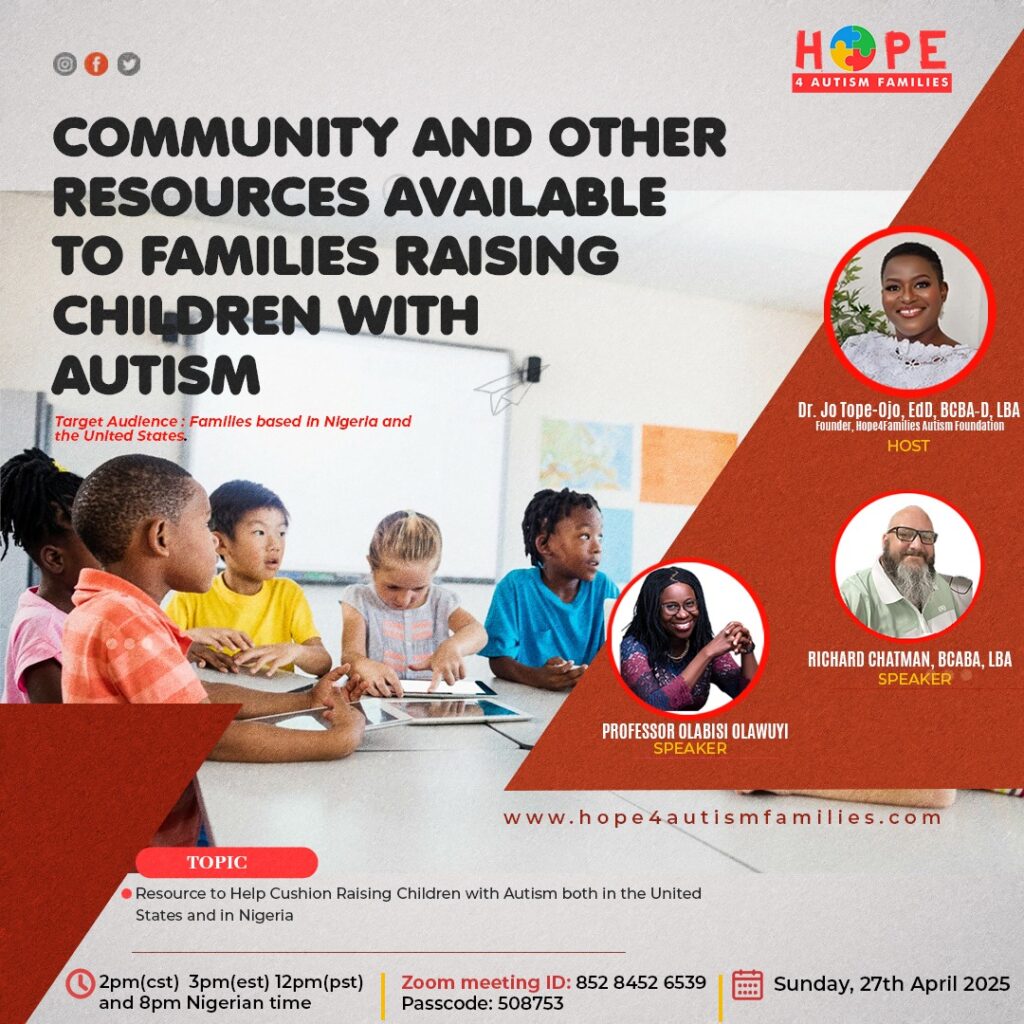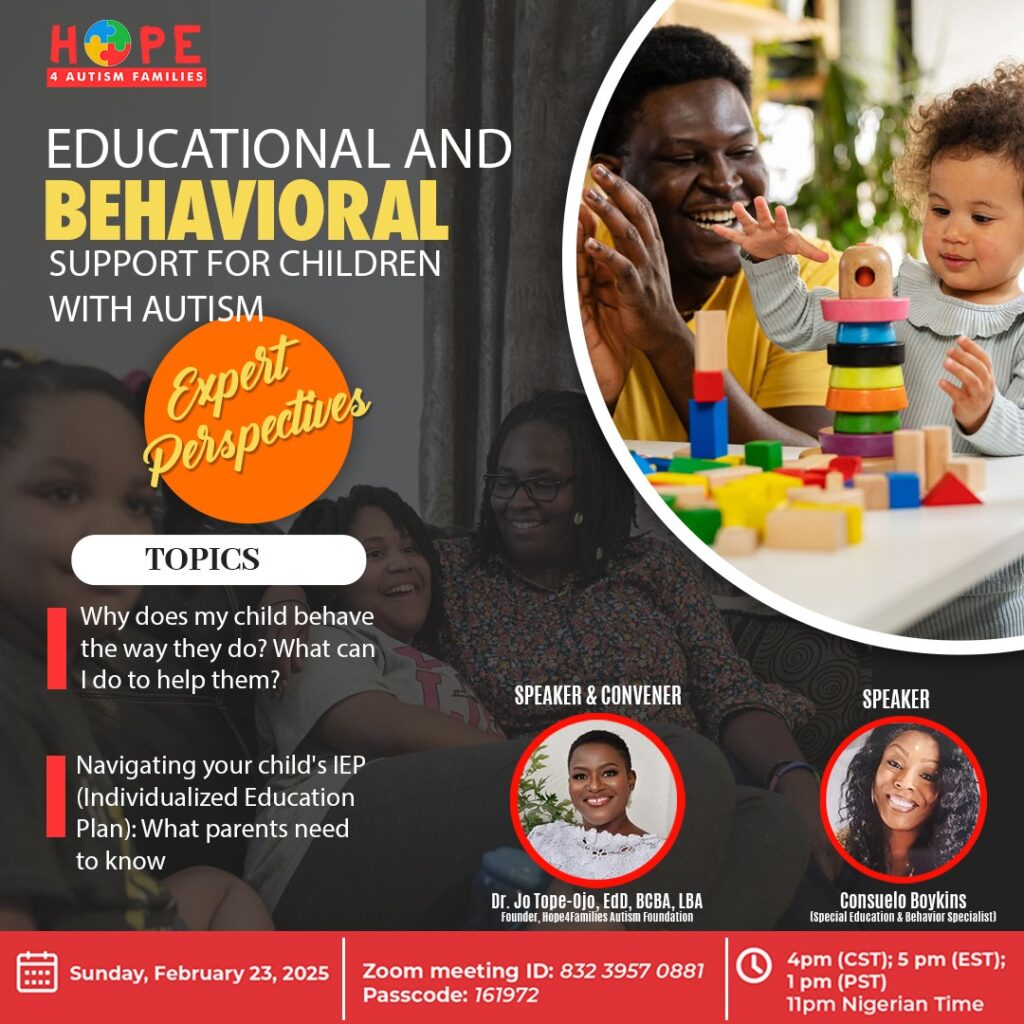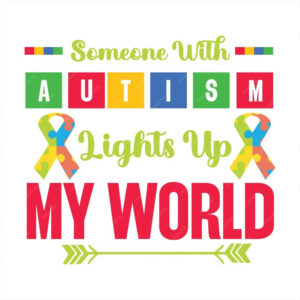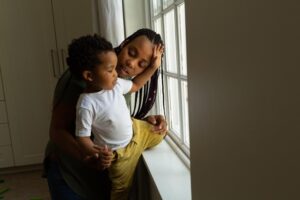Caring For Families
With Autism
OUR PROGRAMS
Here are some of the programs :

In-person/Hands on Training
Traveling with a team of professional volunteers to provide hands-on training for our parents/ teachers and model best practices for them.

Virtual Training
Providing virtual training that are tailored to the needs of our parents/teachers.

Events
Organizing annual events such as Autism Awareness Walk/Run, Art Exhibition, Family Fun Day, Autism Talent Show, Sport Tournament, Workshops and Seminars with the sole aim of providing community engagement, raising, awareness about Autism and supporting Children with autism and their families.

OUR COMMITMENT
Our Mission
To educate and support caregivers (families and teachers) of children with autism or other neuro-developmental disabilities. To create awareness and reduce the stigma surrounding autism diagnosis.
Our Vision
To empower caregivers (families and teachers) of individuals with autism or other developmental disabilities through education, awareness, and support by arming them with evidence based behavioral strategies and other resources to support raising a child with autism or other neuro-developmental disabilities.
OUR STORY
Hope4Family Autism foundation was born out of the need to give back to my home country, Nigeria. After spending 17 years in the public education system, here in the United States; in 2019, I began to sense a profound nudge – which I believe was the Holy Spirit – telling me, I have a different task for you now!
At the time, I wasn’t sure what that assignment was, but I knew something was changing.
During a trip to Nigeria in 2019, the clarity I had been seeking arrived. It became abundantly clear that I was being called to serve as an ambassador of hope for families raising children with special needs, including the professionals who work with this community.
Therefore, after I got back to the United States, in January of 2020, I began to research programs in Special education. My search led me to applied behavior analysis (ABA). At the time, I wasn’t sure what
ABA was, but after a meeting with the program coordinator at the University of Memphis, everything clicked. I applied for a doctoral degree in ABA, and in fall of 2020, I started my journey to becoming a Board-Certified Behavior Analyst (BCBA) and a doctor of Applied Behavior Analysis.

Founder
Dr. Josephine Tope-Ojo
EdD, BCBA-D, LBA
VOLUNTEER WITH US
We are in need of professionals who work with individuals with disabilities such as BCBA,occupational therapists, speech therapists, special education professionals, physical therapists, play therapists, swim therapists and anyone willing to support our mission.
UP COMING EVENTS
Here are some events we are holding this year.

COMMUNITY AND OTHER RESOURCES AVAILABLE TO FAMILIES RAISING CHILDREN WITH AUTISM.
- 27-04-2025
- 2 PM (CST) | 3 PM (EST) | 12 PM (PST) | 8 PM (Nigerian Time)
- venue: ZOOM

EDUCATIONAL & BEHAVIORAL SUPPORT FOR CHILDREN WITH AUTISM PART 2
- 30-03-2025
- 2 PM (CST) | 3 PM (EST) | 12 PM (PST) | 8 PM (Nigerian Time)
- venue: ZOOM

EDUCATIONAL & BEHAVIORAL SUPPORT FOR CHILDREN WITH AUTISM
- 23-02-2025
- 4 pm (CST) | 5pm (EST) | 1pm (PST) 11PM (Nigerian Time)
- venue: ZOOM
OUR BLOGS
ABA FACT SHEET
Applied Behavior Analysis (ABA) methodology involves the application of basic behavioral practices(positive reinforcement, repetition, and prompting) to facilitate the development...
Read More“Mummy, I Can Hear the Rain”: Adaobi’s Journey from Despair to Discovery.. By Dr. Josephine Tope-Ojo (BCBA-D, LBA)
When Adaobi gave birth to Chukwuma, she had dreams of a future filled with laughter, school awards, and birthday parties...
Read MoreEchoes Of A Mother’s Heart – Part 1: The Whisper No One Heard
Echoes of a Mother’s Heart – Part 1 The Whisper No One Heard The sky over Lagos was dimming, the...
Read MoreTESTIMONIALS

AUTISM SPECTRUM DISORDER (ASD).
Frequently Asked Questions. (Faqs)
Autism Spectrum Disorder (ASD) is a developmental disorder that affects communication, behavior, and social interactions. It is called a "spectrum" because it encompasses a wide range of symptoms, skills, and levels of impairment. Individuals with autism may experience challenges in social interactions, repetitive behaviors, and may have unique strengths and abilities.
Autism is typically diagnosed by a team of professionals, including pediatricians, psychologists, and speech-language pathologists. Diagnosis is based on observing the child’s behavior, communication skills, and development. Screening tools and developmental checklists are often used to identify early signs, and formal assessments are conducted to confirm the diagnosis.
Early signs of autism may include:
Delayed speech or language skills
Limited eye contact
Lack of interest in playing with other children
Repetitive movements or behaviors (e.g., hand-flapping)
Difficulty understanding social cues or expressing emotions
Sensitivity to sensory stimuli (e.g., loud noises, bright lights)
Common therapies for children with autism include:
Applied Behavior Analysis (ABA): Focuses on improving specific behaviors and skills.
Speech Therapy: Helps with communication skills, including speaking, understanding, and using language effectively.
Occupational Therapy: Assists with daily living skills and improving fine motor skills.
Social Skills Training: Helps children learn how to interact with others in a social setting.
Sensory Integration Therapy: Helps children manage sensory sensitivities.
Supporting a child with autism involves:
Establishing routines to provide structure and predictability.
Using visual aids and schedules to help them understand daily activities.
Encouraging communication through verbal and non-verbal methods.
Providing positive reinforcement for desired behaviors.
Creating a sensory-friendly environment to reduce overstimulation.
Engaging in activities that build on their strengths and interests.
You can help your child develop social skills by:
Modeling appropriate social behavior and interactions.
Providing opportunities for your child to play and interact with peers in structured environments.
Using social stories to teach appropriate responses and interactions in various social situations.
Practicing role-playing scenarios to build confidence in social settings.
Encouraging participation in group activities or clubs that align with your child's interests.
If you suspect your child has autism, it’s important to:
Speak with your child’s pediatrician or a healthcare provider about your concerns.
Request a developmental evaluation or screening from a specialist.
Seek early intervention services if your child is under the age of three.
Research and connect with local resources, support groups, and autism advocacy organizations.
Managing challenging behaviors involves:
Identifying triggers that lead to the behavior and trying to minimize or avoid them.
Using positive reinforcement to encourage good behavior.
Teaching alternative behaviors that are more appropriate.
Implementing consistent consequences for undesirable behavior.
Working with a behavioral therapist to develop specific strategies tailored to your child.
Self-care is crucial for caregivers. Here’s how you can take care of yourself:
Set aside time for yourself to relax and recharge.
Seek support from family, friends, or support groups who understand your challenges.
Don’t hesitate to ask for help when needed, whether it’s from a professional or loved ones.
Stay informed and educated about autism, which can help reduce stress and uncertainty.
Engage in activities that you enjoy and that rejuvenate you, such as exercise, hobbies, or socializing.
Preparing your child for school involves:
Visiting the school and classroom ahead of time to familiarize your child with the new environment.
Communicating with teachers and staff about your child’s needs, strengths, and triggers.
Creating a visual schedule for the school day to help your child understand the routine.
Practicing social scenarios and classroom activities at home to build confidence.
Collaborating with the school to develop an Individualized Education Plan (IEP) if needed.
Resources for families include:
Local and national autism organizations: They provide information, support, and advocacy (e.g., Autism Speaks, The Autism Society).
Early intervention services: Available for children under three years old to address developmental delays.
Support groups: Both in-person and online, where parents can connect with others facing similar challenges.
Educational workshops and conferences: Offer opportunities to learn about autism and effective caregiving strategies.
Specialized therapy centers: Provide therapies such as ABA, speech, and occupational therapy tailored to children with autism.



